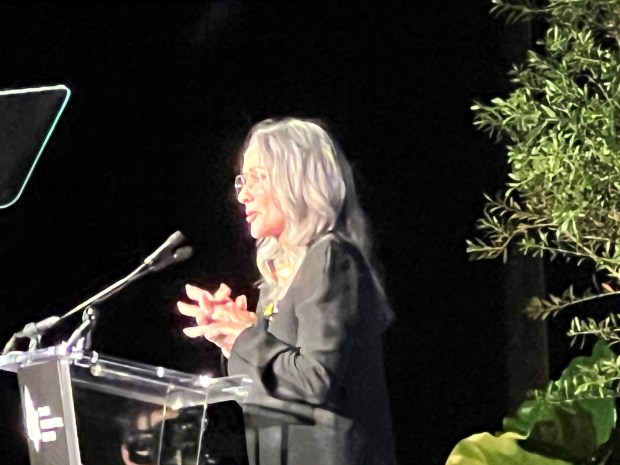After selling enough trees for people to plant at their homes to neutralize the carbon footprint of two Waukegan High School campuses last year, the school’s Environmental Club is planning a reprise in 2024 as well as adding fish to Lake Michigan.
Club members are selling three varieties of trees for $5 each which will be distributed on April 20 as part of the city’s Earth Month activities. Maria Fonseca, a senior at the school and part of the club’s leadership team, said they hope to sell 170 trees.
“We’re distributing the trees to the community so people can plant them in their yards,” she said. “We want to encourage people to experience nature and make an impact on the planet.”
A year ago, the club members calculated planting 250 trees would easily neutralize the carbon footprint of the high school’s Washington Campus. They sold 384, which compensated for the neighboring AOEC campus as well.
After last year’s success — including a national award from the U.S. Environmental Agency (EPA) — Kate Krischke, an environmental science teacher and the club sponsor, said boosting the area’s tree canopy and reducing its carbon footprint was a natural.
“We were really successful last year, and a lot of people showed their community solidarity,” she said. “We were able to work with the community and unite people. They all shared equally in it.”
Since 100 trees were purchased by the Waukegan Port District for planting at the harbor last year, Krischke said they set a goal of 130. Layla Rosales, a senior and part of the club leadership team, said it was realistic.
“It might be less,” she said. “It’s what we need. It will cover our own school,”
Though the goal is less, once they distribute the trees and plant a few of their own, Krischke said soon after they are done, club members will release 240 trout into Waukegan’s ravine system. They will eventually reach Lake Michigan.
Primarily using social media to promote the sale of the trees, Judith Hernandez, a senior and another member of the club leadership team, said about 150 were ordered as of last week.
“We’re already close to our goal,” Hernandez said. “It’s really important to reduce our carbon footprint.”
Rosales, Fonseca and leadership team member Jacqueline Arriaga all said it is important to do something for the environment in their hometown of Waukegan, an environmental justice community with five EPA Superfund sites.
“I’ve lived in Waukegan my whole life,” Rosales said.”I see a way to make a difference. There are a lot of green places where people can help reduce the carbon footprint.”
While some people in other places take wooded areas with clean water and air in a green community for granted, Fonseca said it is important to get people in Waukegan involved.
“Waukegan is an ideal place to restore our habitat,” Fonseca said “This will help push it further.”
Arriaga said she was raised to appreciate tending to the environment and greening the community. It was part of her family’s culture for as long as she can remember. She wants to continue the legacy.
“My grandpa, my father and my cousins work in landscaping,” Arriaga said. “It’s important we take the carbon out of the air.”
Once the trees are distributed to the individuals who ordered them, Environmental Club members will shift to growing the supply of fish for Lake Michigan. Krischke said they are feeding and caring for the 240 trout — 120 in each of two tanks — for the spring release into the ravines.
Working with the Illinois Department of Natural Resources, Krischke said raising fish and releasing them is something the department does each year. She decided to get the club involved.
Those who reach adult maturity in four years will find their way back into the ravines in the Washington Park location where they will be released.
“They spawn like salmon,” Krischke. “They will return to the ravine.”



